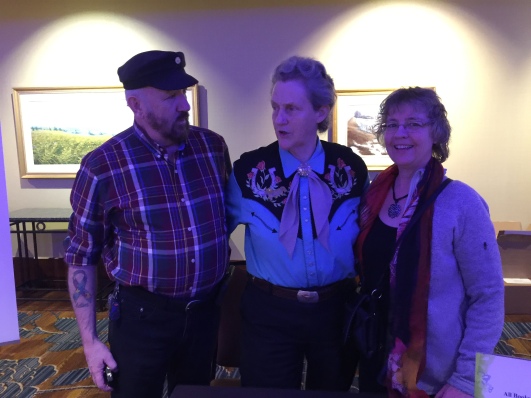Diablogue #6:

Helpful Hint: Use any and all resources, whatever works. Don’t disregard any method or action that could prove beneficial. The more tools you have in your toolbox, the easier it will be for all—spectrum or non-spectrum.
So, let’s diablogue:
Christina: Let’s talk about what we gained from the Temple Grandin talk February 22.
Ken: I agree. There were some very important points I would like to touch on here and expand upon in future posts.
Christina: I liked it when she said, “Focus on what they can do, not on what they can’t do.” Autism is often framed so negatively: “They can’t socialize, they can’t do this, they can’t do that.”
Ken: The result of all the negative feedback can create a sense of worthlessness, disconnection, and low self-esteem. In adults, these are all potential barriers to employment.
Christina: Yeah. Temple said most people with autism are underemployed—if employed at all.
Ken: I myself have been a victim of this process of negative reinforcement all through my working life.
Christina: She talked a lot about kids—since there were so many parents there. An autistic teenager in the audience said she was angry a lot. Temple told her, “You have to find out what’s triggering it…what’s making it happen.”
Ken: People often forget that tantrums, frustration, and anger often have a trigger—like a baby crying; there is always an underlying cause. Autistic people are hyper-susceptible to the environment and the stimuli around them. Therefore, they can instantaneously experience sensory overload and become overwhelmed.
Christina: Yes, we should “find the root” rather than just get caught up in the symptoms. But she also told parents to regularly move their children “out of their comfort zone—don’t throw them in the deep end of the pool, but stretch them.”

Ken: Our family and friends—God love them—are trying to overprotect us. They don’t realize that they will not always be there for us. We need to practice living independently for when we no longer have them as supports.
Christina: Right. She said her mother expected her to greet people at parties and later take a paper route. She said it was difficult, but she wouldn’t have gotten to where she is without that kind of pushing.
Ken: I remember her referring to a 13-year old autistic boy who never ordered his own food at McDonalds. His mother ordered for him. That’s a poignant example of robbing the boy of a chance to practice, in a safe environment, his social skills which will be essential for him in the future.
Christina: And that can lead directly to what Temple said were “kids who are underprepared, under-supported, and under-transitioned for employment”—especially because of problems in the last years of high school.
Ken: We need to discover, right in the beginning years of school, what students are interested in and what they’re good at, and then tailor their education to focus on what they can do. Enabling them to increase their chances to succeed and be better prepared to live a more productive and independent life.
Christina: That would be a good change for all students. Ok, for the last point I want to talk about the “pilot’s checklist.” Temple said that people on the spectrum need to have check boxes for jobs. They need tasks broken down into steps, “1,” “2,” “3” in linear order so as not to overload the short term memory.”
Ken: Yes. Even though a pilot has been a pilot for 40 years, before take-off, in order to perform the task accurately without missing essential steps that could have serious consequences, they refer to a checklist that never varies.
Christina: Lists, right. They’ve become an essential part of our life—even for ordinary things like shutting the blinds or kissing me goodnight.
Ken: I agree, as I am realizing to my benefit. People with autism tend to have intense and narrow focus; we cannot multitask. If we are distracted from our current task, unlike most people, we often cannot remember where we left off. When the distraction is removed and we return to the original task, we become confused about where we are. We could end up missing crucial steps. That is why we need a pilot’s list.
Christina: Absolutely. So, next time we need to explain your formal speech patterns. Some folks are wondering about what you call your “Spock-Talk.”
Next post: Diablogue #7 – “Ken’s Spock Talk” (to attend to some previous comments)



